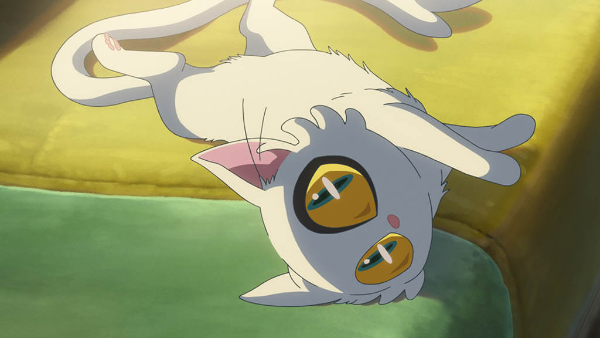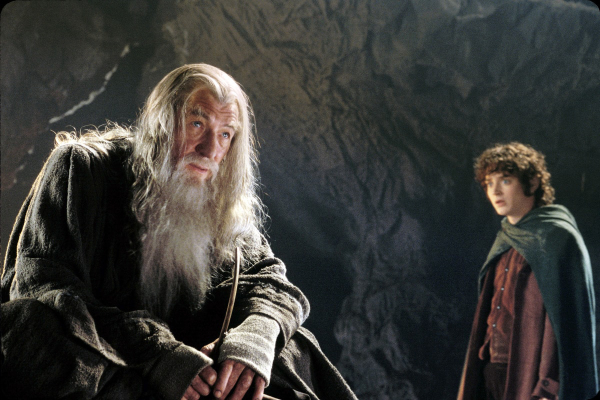When I first saw trailers for Suzume, the gorgeous shots of a mysterious abandoned resort with a Narnia-esque door caught my attention at once. Throw in a cute cat and a sentient three-legged chair and I was hooked.
I was able to see Suzume in theaters, and I can solidly say that it’s my second-favorite of Makoto Shinkai’s films (nothing will be able to beat Your Name). The ascetics and animation were stunning, the soundtrack ranged from deliciously creepy to whimsically heartwarming, and while many characters only made short cameos, they left a deep impression on me.
However, what I found most riveting about the film, and what has stuck with me for months after, is one very particular trait of the main character, Suzume: the way she shows mercy to others.
Suzume’s Secret Superpower
Suzume (voice of Nanoka Hara) is a person who has suffered loss. Her past and experiences have hurt her in some ways, but they’ve also made her deeply committed to helping others, living with a merciful heart turned toward others. Throughout the film, we see her desire to bring healing and life to others through her dreams of becoming a nurse, through her genuine interest and care for the strangers she meets, and through her willingness to sacrifice what she loves to secretly save the lives of millions. But there is one scene in particular when Suzume is alone with her enemy that I believe speaks most powerfully to her commitment to mercy.
(Undetailed spoilers about the plot ahead)
It comes at a point in the film when it seems Suzume has lost everything. She’s alone and hurt and it isn’t clear what she should do next. Then she is approached by Daijin (that cute cat that caught my attention in the trailer). Daijin (voice of Ann Yamane) has been the catalyst for most of the problems Suzume has encountered, and she sees him as directly responsible for a deep loss she’s recently experienced. What’s worse, Daijin doesn’t seem to understand or regret what he has done. He approaches Suzume, expecting her attention and affection (he’s been harboring the wish to be her pet throughout the film) and Suzume finally snaps. She picks him up in a moment of fury, ready to hurl him to the ground. But at the last moment, she stops herself. All the tension goes out of her, and she lets Daijin go free.

Daijin voiced by Ann Yamane in "Suzume." © 2022 CoMix Wave Films. All Rights Reserved.
Suzume has every reason to lash out against this creature whom she blames for so much of her pain. But even though there are no witnesses and seemingly no consequences, she’s ultimately able to reign in her anger rather than letting it control her. She even stops herself from telling Daijin that she hates him—a small mercy for the cat who is confused by her negative reaction to him. Daijin is still crushed by the way Suzume doesn’t want him to become her pet, but the door is left open for future interactions between them.
The Gollum Dilemma: To Kill or Not to Kill?
The scene reminded me of a very different story: J.R.R. Tolkien’s The Lord of the Rings.
Early on, the wise wizard Gandalf has a conversation with Frodo about Gollum, who has revealed their location to the enemy. Frodo argues that Bilbo should have killed Gollum when he had the chance. Yet Gandalf points out that Bilbo made the much stronger choice, and he gives this definition: “Mercy: not to strike without need.” Bilbo did not attack Gollum when he was defenseless, even though he had every reason to, and Gandalf is certain that this act of mercy will not go unrewarded. “My heart tells me that he has some part to play yet, for good or for ill, before the end” (quotes taken from the chapter The Shadow of the Past in The Fellowship of the Ring). Frodo chooses to listen to Gandalf’s advice, showing mercy to Gollum himself later in his travels. Though Gollum does indeed betray Frodo and cause him a great deal of trouble, it is because of Gollum that the Ring is ultimately destroyed and their enemy defeated. One seemingly small act of mercy had a huge effect on the fate of the world.

Ian McKellen as Gandalf and Elijah Wood as Frodo in "The Fellowship of the Ring." © 2001 New Line Cinema. All Rights Reserved.
So it is with Suzume. She spares Daijin, who in the end plays an essential role in resolving the difficulties they face and saving the lives of both main characters. He makes a sacrifice for Suzume that will change her life forever, at great cost to himself--something which he may have been unable or unwilling to do had she not stopped herself from being cruel to him in her lowest moment.
Jesus, Fount of (Un-sugarcoated) Mercy
Much greater than Suzume or Frodo is the example of mercy Christ leaves us by dying on the cross. That is the ultimate act of mercy, the one we can turn to every time we need to learn how to better live out mercy ourselves. Jesus didn’t deserve that punishment. He didn’t enjoy that painful death. But he underwent it out of love for you and for me so that we could be saved.
Sometimes we can fall into the trap of idealizing mercy. It’s easy to want to be merciful in the abstract, saying we’ll forgive our enemies and be kind in the face of difficult circumstances. But how easy is it to show gentleness and compassion--or even to refrain from striking without need--when our blood is boiling with anger, or when we’re frightened for those we love, or when our heart is broken from a tragedy that could have been averted?
Mercy can come at a great price that we may not be able to predict ahead of time. It’s always a risk. When Gollum betrayed him, Frodo was attacked by a giant spider that nearly killed him. And let’s not forget that the object of our mercy may be less than desirable. Perhaps we’d find it in us to be merciful if the person who had wronged us was properly apologetic and willing to make amends. But mercy is mercy first and foremost when it is given regardless of whether or not it is deserved. Daijin didn’t even know Suzume was angry with him, adding insult to injury. Gollum tried to kill Frodo—not exactly a gracious response to having his life spared. Jesus died for us while we were still sinners and most of us are sinners still. We turn away from that mercy God extends to us every time we choose sin. Yet God keeps on showing it to us anyway. “Indeed, rarely will anyone die for a righteous person--though perhaps for a good person someone might actually dare to die. But God proves his love for us in that while we still were sinners, Christ died for us.” (Romans 5:7-8).

The Crucifixion, by Jacopo Tintoretto. Public Domain. Image from Wikimedia Commons.
Risking Mercy Right Where You Are
We may not be faced with crucifixion, but life inevitably presents us plenty of opportunities to show mercy. Every time someone wrongs us, we have a chance to respond with love and forgiveness, to wish them well rather than evil, to refrain from cruelty and harshness. Those occasions for mercy might be as big as taking the first step toward reconciliation in a years-long family grudge, or as small as curbing our temper when someone cuts us off in traffic.
Whatever the scale, when occasions to show mercy arise in our lives, they won’t be easy. They’ll require risk. Laying aside our own anger, fear, or desire for revenge. Showing love to someone whom we might feel doesn’t deserve it. And we might never see it pay off in this life. In Suzume and the Lord of the Rings, there’s a satisfying wrap up; we see the direct consequences of what happens when they make the difficult choice to spare their enemies. But our stories aren’t complete in two hours like Suzume (or even 3,000 pages like the Lord of the Rings). We may never see the fruit of our acts of mercy and understand how it all fits. But we trust Jesus, who promises, “Blessed are the merciful, for they will receive mercy” (Matthew 5:7).
No act of love goes forgotten by God. Each time we exercise mercy, be it big or small, we receive grace that strengthens our souls, becoming more like Christ. We allow God to touch others with his own mercy through us, and we remember that we ourselves often need to be shown mercy by our loved ones and by our Lord.
Changing the Tide
Suzume didn’t know Daijin would later help her save the day. When she lets him go, she’s able to remember who she is, find her stride, and overcome unsurmountable odds to save the world and her loved ones. And it all started from that unseen act of mercy.
Relying on God’s grace, may we have the courage to do likewise when faced with difficult choices in dark moments.
Our guest blogger is Sr. Allison Regina Gliot, FSP. She is an author and editor for Pauline Books & Media, the publishing house of the Daughters of St. Paul. She loves anime, but not as much as she loves Jesus. Connect with her @sister_allison.